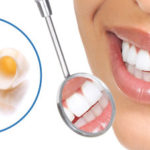Even though a lot of people want a brighter, more attractive smile, teeth whitening might not be for everyone. This lack of suitability could be short-term or it could apply indefinitely. It depends on two main reasons. First, it’s simply a result of how the whitening process works. Second, a dentist has the professional responsibility to take into account personal factors associated with each patient prior to performing any treatment – even something as seemingly simple as whitening. Whether in-office or take-home options, if you find that teeth whitening isn’t the best route for you, there are many other cosmetic dental possibilities that are available to help you get the confidence you want from the smile you’ve longed for.
To begin with, we firmly believe that everyone should have the most appealing smile possible, whether it’s a result of whitening or some other option. When you’re confident that you have a great smile, you feel empowered and free to unlock your inner awesomeness so the world can see your poise, boldness, passion, playfulness…so others get to see how truly special you are. We learned a long time ago that people who are embarrassed by their smile, or feel awkward smiling due to dental issues or imperfections, tend to smile less – or not at all. As a result, these people miss out on so much of what a great smile can do for them, and for those around them.
Although smiling does suggest to others that you’re happy or friendly, in actuality, smiling is also healthy! Studies have proven that when you smile, not only do others perceive you as approachable and being in good spirits, but smiling can even lower blood pressure and help reduce stress hormones. So, smiling helps relationships and improves your health, which can help you to feel better, too. Amazing! Who would have thought that something as simple as a smile could be the key to a better personal impression and the cure for what ails you!
How Does Teeth Whitening Work?
When we’re talking about teeth whitening, it’s important to clearly define the concept. The term ‘whitening’ refers to a process that’s used to help lighten the color of teeth and remove any stains or discoloration. Since teeth are porous, a whitening process actually takes place on a molecular level. The whitening method involves the application of a professional whitening gel to the teeth. This gel contains active ingredients that open the pores in the teeth to allow the whitening agent (a form of peroxide) contained in the gel to penetrate the outer enamel and make its way into the dentin or interior of each tooth. Upon entering the teeth, the oxygen molecules of the peroxide-based whitening agent come into contact with the existing discolored molecules. This collision causes the discolored molecules to separate, thereby, revealing the natural color of the teeth. This subsequent separation and elimination of discolored molecules needs to occur several times to effectively remove any stains and to restore the teeth to their natural luster. That’s why in-office treatments take about sixty to ninety minutes and why professional take-home products are used over days or weeks.
Types of Teeth Stains
Basically, stains are classified as either surface stains or as stains within the structure of the teeth themselves. Whitening can be used in both instances, however, the type and severity of stain you want to correct plays an important role in the success of the whitening result.
Extrinsic Stains (surface stains): stains that only penetrate the outer layers of a tooth. These stains result from normal eating and drinking, and typically respond well to professional whitening.
Intrinsic Stains (structural stains): stains found deep within the structure of a tooth. These stains are usually caused by aging, certain medications or trauma to the mouth, teeth, and gum area. Stains of this nature are very difficult to remove and may or may not respond well to professional whitening processes. In those instances, alternatives such as porcelain veneers may prove to be your best solution to brighten and enhance the attractiveness of your smile.
Teeth Whitening Factors and Considerations
As we mentioned earlier, not everyone is a suitable candidate to have their teeth professionally whitened. Aside from the type of stain (extrinsic vs intrinsic) to be removed there are other factors we evaluate when determining if someone could benefit from the process.
- Tooth and Gum Health
Prior to beginning any cosmetic procedure, it’s imperative to make sure that there aren’t any underlying issues. Your teeth and gums should be in good health, functioning properly, and not pose any existing or potential problems. Areas involving cavities, weak or damaged teeth, failing dental restorations or gum disease must be ruled out or corrected prior to undergoing a whitening process.
- Sensitivity
Prior to the whitening process, anyone dealing with pre-existing sensitivity issues may experience heightened sensitivity or discomfort as a result of the whitening process. This is due to the whitening agent used in the gel. If you already have intense sensitivity issues, there are other cosmetic options available to create a brighter, bolder smile that a dentist may recommend.
- Restorative Procedures
If you have existing visible restorative dental work (such as crowns, fillings or bonding) you need to know that whitening agents don’t work on the materials used in these processes. Any attempt to whiten them will result in an effect that’s uneven and unappealing. In those instances, options like dental bonding or porcelain veneers provide a far superior alternative.
- Pregnancy
When pregnant, any substance a woman ingests or applies topically can find its way to the baby. For this reason alone, we believe it’s always better to exercise caution. Whitening can always be applied once you are no longer pregnant or breastfeeding.
- Age
It isn’t a good idea, and we won’t provide the service, to anyone under the age of sixteen. Although boys and girls are approaching the cusp of young adulthood at this age, their teeth are typically not yet fully developed. As a result, younger patients often experience uncomfortable sensitivity side effects. They can always have the whitening process once their teeth reach an acceptable level of maturity.
Farragut and Knoxville’s Cosmetic Dentist
We want your smile to not only be a reflection of your confidence but a reflection of your complete experience with our West Knoxville dental team. If there’s anything we can do to help enhance your smile, so you can build your confidence and embrace life more boldly, please let us know. Whether it’s whitening, a cosmetic smile consultation, restorative work, family dentistry or other need, please contact us here.





